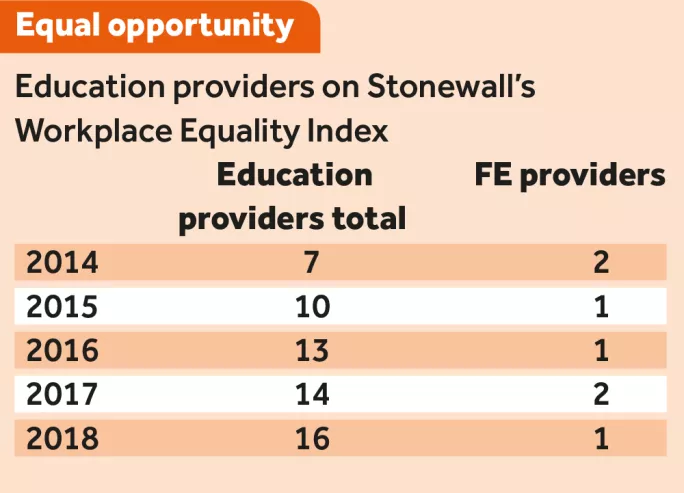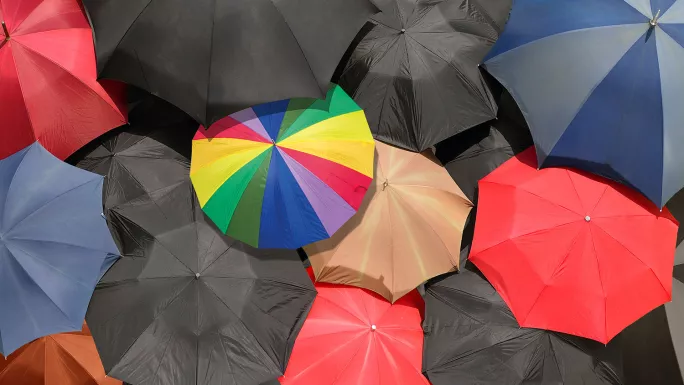Colleges are put in the shade when it comes to equality

College offers the thousands of young learners who enrol on courses each year a chance to start afresh. This makes it an exciting - and also daunting - prospect for many. But for LGBT students, going to college can bring with it a whole extra set of challenges.
While the campus can be a place to explore identities and meet like-minded people, perhaps for the first time, for many young people, the environment is not conducive to being themselves. Research shows that a significant proportion of LGBT students in further education experience bullying and harassment linked to sexual orientation and/or gender identity in their place of learning.
And this is not an issue for students alone. The Pride and Prejudice in Education report, published in February 2016, showed that one-in-three FE staff reported seeing another colleague act aggressively towards someone because of their sexual orientation.
Another conclusion of the study is that the learning environment in FE is often less welcoming for LGBT learners than universities. So what exactly is it that universities are doing that colleges seemingly do not?
Workplace equality
One clear thing that colleges are not doing is engaging with LGBT charity Stonewall’s Workplace Equality Index.
The list - which has become a benchmark for the “Top 100” inclusive employers in the UK - provides an endorsement of an organisation’s equality policies.
A total of 434 employers entered this year through a process of self-nomination and the 2018 index includes 16 employers from the education sector. However, the only FE college to be selected is Newham College; this compares with 14 universities.
The London college is seen as a trailblazer for inclusivity, as it has featured on the list for seven of the past 10 years. In fact, only two other colleges have made the list in the same timeframe: Somerset College, twice, and Vision West Nottinghamshire College, once.
“We encourage all organisations, including FE institutions, to take part in our annual Workplace Equality Index,” says Stonewall director Pete Holmes. “More FE institutions can follow Newham College’s lead and come out for LGBT equality in the workplace.”

Ian Pretty, chief executive of the Collab Group of colleges, says he is shocked that more colleges are not featured on a list that seeks to showcase how much an organisation cares about inclusivity.
“Does the FE sector take seriously the importance of things like Stonewall? Does it take seriously that LGBT employees feel that the company or organisation they work for is a positive role model for other LGBT people or not?” he asks. “Not participating in this sends out a signal.”
One former FE student says that starting college at the age of 16 was the time when he first began to accept his sexuality. “It was a safe space where I could ‘trial’ being me,” says Anthony Francis, who studied for a BTEC in IT at a college in the Midlands.
He says students and teachers were quite open and accepting of LGBT students such as himself. But he adds: “I don’t remember there being any support - or even any acknowledgement - of sexuality while at college. I think that it would have been nice to have something or someone to go to for support, as my sexuality was a real struggle for me and probably affected my performance during my first year.”

Kirsti Lord, deputy chief executive of the Association of Colleges, says that there is always more to be done on this issue, despite some great work already going on in FE.
“Colleges across the country are doing excellent work engaging with and supporting LGBT students and staff - including working with Stonewall to deliver training programmes, running LGBT advisory groups chaired by students and staff, and working with senior managers to raise awareness of issues throughout LGBT History Month and beyond,” she says.
“We will be working with members to raise the profile of Stonewall’s work and the top 100 employers list, and we will encourage and support any colleges that wish to apply in future years.”
The University and College Union (UCU) says that researchers are this week launching a follow-up report to Pride and Prejudice in Education, which will be published in late spring. UCU head of FE Andrew Harden says: “Those results will help inform our work to build colleges where everyone can work and study in an environment that fosters inclusivity and is free from bullying or prejudice.”
You need a Tes subscription to read this article
Subscribe now to read this article and get other subscriber-only content:
- Unlimited access to all Tes magazine content
- Exclusive subscriber-only stories
- Award-winning email newsletters
Already a subscriber? Log in
You need a subscription to read this article
Subscribe now to read this article and get other subscriber-only content, including:
- Unlimited access to all Tes magazine content
- Exclusive subscriber-only stories
- Award-winning email newsletters